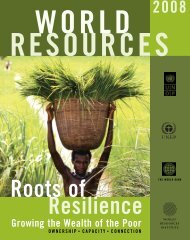jp8589 WRI.qxd - World Resources Institute
jp8589 WRI.qxd - World Resources Institute
jp8589 WRI.qxd - World Resources Institute
Create successful ePaper yourself
Turn your PDF publications into a flip-book with our unique Google optimized e-Paper software.
THE BENEFITS OF FAIR TRADE<br />
TO COFFEE FARMERS IN HONDURAS<br />
US$ Per Pound of Arabica Coffee<br />
$1.75<br />
$1.50<br />
$1.25<br />
$1.00<br />
$0.75<br />
$0.50<br />
$0.25<br />
hamlet committees as the middle tier, and an elected board, with<br />
members from every village, as the highest decision-making<br />
authority (Down to Earth 2004:44). The board’s first actions were<br />
to set up a milk cooperative and a small credit union through<br />
which villagers could sell milk and borrow small sums at far less<br />
interest than charged by middlemen (TPI 1999).<br />
Once the cooperative was functioning, RCDC linked the<br />
villagers with Tea Promoters of India (TPI), a Calcutta-based,<br />
family-owned company that manages four organic tea gardens,<br />
all run according to Fair Trade standards. During a series of<br />
negotiations, the cooperative board voted that all members<br />
would convert to organic farming, while TPI undertook to buy<br />
the villagers’ tea supply, distribute grasses used for soil rehabilitation<br />
to the farmers, and train them in organic techniques<br />
including composting, pruning, and use of natural pesticides.<br />
The company also supplied 4,800 tea saplings at a 50 percent<br />
discount (TPI 1999:1-2).<br />
$0.00<br />
1992 1996 2000 2004<br />
Average price paid to producers in Honduras<br />
2004 minimum Fair Trade price set by FLO<br />
2004 minimum Fair Trade price set by FLO for<br />
organic beans<br />
Tea-leaf production from the villages has grown steadily since<br />
the first collection for TPI in May 1998. Tea collectors are<br />
selected from the community by each hamlet committee, and<br />
paid a wage by TPI. Other co-op members transport the leaves<br />
to TPI’s nearest tea garden, where they are processed and<br />
blended for export (Down to Earth 2004:44).<br />
Source: FLO 2004, ICO 2005<br />
families had small landholdings averaging 1.5 acres. Their<br />
soil’s high acidity, the result of intensive tea cultivation, led to<br />
very low productivity. Local deforestation had also contributed<br />
to soil erosion, landslides, and the loss of forest products<br />
(RCDC 1996:5-7).<br />
Most families lived a precarious existence, surviving on less<br />
than 12,000 rupees per year (US$275). A 1996 survey by a<br />
local development NGO, the Darjeeling Ladenla Road Prerna<br />
(RCDC), reported that the villagers “have very low self-esteem<br />
and display an attitude of despair.” When asked their views on<br />
development priorities for their communities, 30 percent<br />
replied “no idea” (RCDC 1996:4).<br />
Samyukta Vikas Cooperative is the first non-plantation, cooperative<br />
tea supplier established in Darjeeling. Since 1999,<br />
organic English Breakfast, Earl Grey, and green tea sourced<br />
from its family-owned plots has been exported by Tea Promoters<br />
of India to the Fair Trade company Equal Exchange, based in<br />
Massachusetts. From there it is sold to food co-ops, health<br />
stores, churches, restaurants, and cafes around the United<br />
States. TPI, Equal Exchange, and Dritwelt Partners, a European<br />
certification organization, jointly bore the cost of the international<br />
organic certification process for the Samyukta Vikas<br />
Cooperative’s tea supply. In 2004, Tea Promoters of India<br />
provided more than eight tons of tea to Equal Exchange (nearly<br />
140,000 boxes), 10 percent of which came from the Samyukta<br />
Vikas Cooperative (Howard 2005).<br />
All this changed in 1997 when RCDC persuaded the villagers to<br />
form the Samyukta Vikas Cooperative and use their own resources<br />
to improve their livelihoods. Three community members were<br />
chosen as “animators” and trained by RCDC in participatory<br />
decision-making and co-op management. These three explained<br />
what they had learned to households across the scattered<br />
hamlets. The villagers then voted to establish a cooperative of<br />
three levels, with farmer families as the bottom tier, elected<br />
While it remains a small-scale enterprise, the successful collaboration<br />
between community-owned farms in Darjeeling, local<br />
Fair Trade exporters, and overseas Fair Trade importers demonstrates<br />
one route by which global markets, when combined with<br />
fair prices and local governance over use of natural resources,<br />
can benefit poor producers in developing nations. <br />
95

















